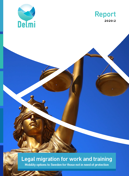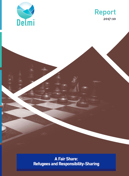Overall conclusions and recommendations
- Sweden can with the help of diaspora groups, via the internet, through the foreign representation of Swedish companies, employers' organizations or authorities, work to improve the matching of suitable jobseekers in third countries with employers in Sweden in need of labour. These matching services could to some extent be aimed at countries where from many people today leave to travel to the EU irregularly.
- In order to improve or expand the legal ways to study in Sweden, scholarships and funded exchange programs could be developed and expanded. Here, too, one could imagine a special focus on countries in the global south where young people are interested in acquiring education abroad.
- Possibilities for sponsorship through public or private employer and industry organizations could be explored to make it easier for people who want to undertake non-academic studies in Sweden, for example vocational training at folk high schools. This possibility can be particularly relevant if students and trainees can be connected with education in professions where there is a shortage of labour.
- Bilateral collaborations with third countries regarding migration for work or study purposes could function as a complement to Sweden's general, country-of-origin neutral migration rules. From a migration management perspective, this could be valuable as cooperation and dialogue with third countries on the admission of students, trainees or workers could facilitate cooperation on returning irregular migrants and rejected asylum seekers.
- An exception to the basic rule that a residence permit must be applied for and granted before entry should be considered to make it easier for Ukrainian citizens and other groups from Ukraine to obtain work or study permits in Sweden when the Temporary Protection Directive expires.
About the author
Bernd Parusel is a researcher in political science at the Swedish Institute for European Political Studies (Sieps).
Photo: Karsten Würth Unsplah.


